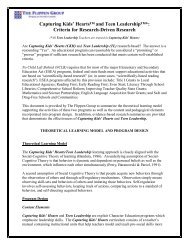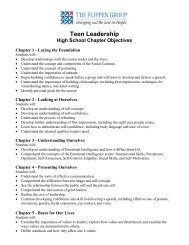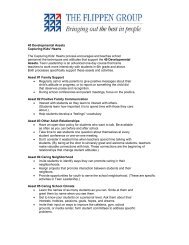Smart & Good High Schools - The Flippen Group
Smart & Good High Schools - The Flippen Group
Smart & Good High Schools - The Flippen Group
- No tags were found...
Create successful ePaper yourself
Turn your PDF publications into a flip-book with our unique Google optimized e-Paper software.
CHAPTER 5: Fostering the 8 Strengths of Character—Outcome 8It takes deep introspection, careful analysis, thoughtfulexpression, and often many rewrites to produce it in finalform. It may take several weeks or even months before youfeel it is a complete and concise expression of your innermostvalues and directions. 40“A mission statement takes deepintrospection and many rewritesto produce it in final form.”In keeping with Covey’s exhortation, Mrs. A’s studentssubmitted the first drafts of their Personal Mission Statementsfor teacher and peer feedback but then continuedto refine them all semester.OUTCOME 8:Spiritual PersonPromising Practice 4:8Have students formulate andpursue meaningful life goals.Cultivating Heart and Character by TonyDevine and colleagues reports research indicating thatcultures around the world affirm three life goals assources of authentic happiness:1. maturity of character—becoming the best person wecan be2. loving relationships, such as marriage, family, andclose friendships.3. contributing to society—making a positive differencein the lives of others. 41We should share this research with our students. <strong>The</strong>n,within these three broad life goals, we can challengethem to formulate and pursue the particular goals thatwill give their individual lives meaning and direction.Lewis Terman’s research found that intellectually giftedhigh school students who learned to set and pursue goalswent on to achieve much higher levels of success thanequally gifted students who did not learn to set goals. 42One history teacher said, “If I were granted one wish forBorn originals, how comes it to passthat we die copies?—EDWARD YOUNGimproving education in this country, it would be toinclude instruction in goal-setting in every school.” 43 Toteach goal-setting in his classes, this teacher gave his studentsan assignment called “100 Goals” (see box).Says one of this teacher’s former students who is now apre-med student at U.C. Santa Barbara:100 GOALS1. Write at least 100 goals, more if you wish.2. Divide them into categories. You can choose yourown categories based on your interests. Here aresome you might want to consider; I encourage youto add some of your own:◆ education◆ career◆ family◆ learning◆ service to others◆ fun/adventure◆ creating/making/building◆ self-improvement◆ things you’d like to own◆ reading◆ U.S. travel◆ foreign travel◆ personal improvement◆ spiritual growth◆ major accomplishments.3. After you write the 100 goals, select the 10 thatare the most important to you. Write them in anyorder. <strong>The</strong>n write a paragraph on your #1 goal.Explain why it is so important to you.4. This assignment will be a significant part of your secondquarter grade. You have two choices:◆ Treat this as just another stupid school assignmentthat has to be done; or◆ Treat it as if you’re writing a preliminary blueprintfor the rest of your life. Write out a lifeplan that will keep you from becoming one ofthose “nice dead people” who go through themotions of living but never really live.5. If you do decide to take this assignment seriously,remember: THINK IN TERMS OF POSSIBILI-TIES, NOT LIMITATIONS.203<strong>Smart</strong> & <strong>Good</strong> <strong>High</strong> <strong>Schools</strong>















